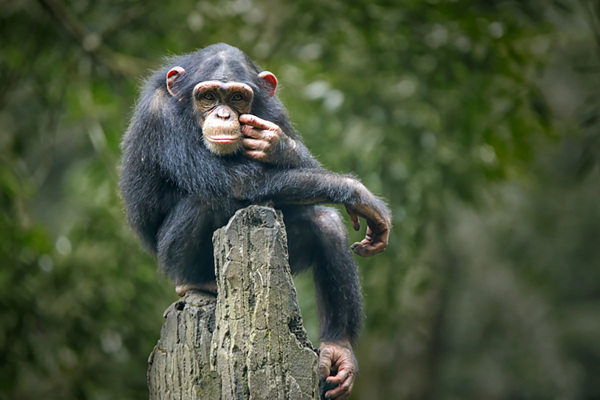
What are the genetics of being right vs left handed?
June 3, 2005

- Related Topics:
- Genetic myths,
- Complex traits,
- Environmental influence,
- Handedness
A curious adult from Florida asks:
“I’m just curious about the genetics of handedness. Both of my parents are left-handed, both myself and my brother are right-handed. My husband and I are both right-handed and we have 2 children, one’s a lefty and one’s a righty. My husband’s parents are both righties.
It’s just something I’ve always wondered about since we studied genetics in 6th grade and the teacher told us that handedness was Mendelian like eye color, but couldn’t explain why I’m a righty (no doubt wondering if maybe I was adopted, which I wasn’t, lol!)”
Your teacher was close in that handedness is like eye color. Except that what makes them similar is that neither is a simple Mendelian trait.
A simple Mendelian trait is one where there is a dominant and a recessive version of a gene. Remember, we have 2 copies of most of our genes—one from mom and one from dad.
If a version of a gene is dominant, then you only need one copy of that version to see a trait. If a gene version is recessive, then you need two copies of that version to see the trait.
When people have looked at handedness, it just doesn't follow simple rules like this.
For example, imagine that being right handed was a dominant trait. You'd be right-handed with either one or two copies of the right hand gene. To be left-handed, both copies would have to be the left hand gene. That also means two lefties would always have left-handed children. This is not the case for your family or lots of others either.
For example, if both parents are right-handed, there is a 1 in 10 chance of having a left-handed child. If the father is left-handed, the odds are 2 in 10. If the mother is left-handed, the odds rise to 3 in 10. And if both parents are left-handed, the child has a 4 in 10 chance of being left-handed.1
If a classic dominant-recessive model were in play, then left-handed people would only have left handed kids. But they don't even have left-handed kids most of the time!

What's going on here is that genes aren't the whole story. The best evidence that something besides genes are involved comes from looking at identical twins.
Remember, identical twins start out with exactly the same DNA. If something is completely determined by genetics, then if one identical twin has it, the other in the pair should as well.
And it turns out that this isn’t the case for handedness. Estimates vary, but in about 17% of identical twins one is left handed while the other is right handed.2 Clearly genes aren't enough. So, what else is involved?
Most likely, the environment plays a role. There are probably one or more genes that make you more likely to become left-handed. You then need some sort of environmental trigger for it to happen.
This is what happens with, for example, juvenile diabetes. Scientists believe that not everyone who has the genes necessary for diabetes get it. A current theory is that you need certain genes and a viral infection to get the body to attack its own pancreas and give itself diabetes.
But is there any evidence for a trigger with handedness? I couldn't find much research in people, but some interesting studies have been done with chimpanzees.
In chimpanzees, being right handed is about twice as common as being left handed (as opposed to around 9 times as likely in humans). When scientists studied chimpanzees, they found that the chances for having a left-handed baby increased significantly based on birth order. The first and sixth or later babies had a much higher chance of being left-handed than did the middle ones.3
What do the first and later pregnancies have in common? They tend to have hormonal variations that don't happen with the middle pregnancies. And this might be the environmental trigger we're looking for.

There is some evidence in humans that birth order may play a role as well. Nothing as clear-cut as we see with chimps but we do know that older mothers tend to have more left handed children. Also, at least with boys, some studies have shown that later kids are more likely to be left-handed.4
So, handedness is most likely due to a combination of genes and environment. Some people have a greater chance of being left-handed but something needs to trigger it.
Remember, the identical twin story argued against genes being the whole story. It also argues that birth order isn't everything either. If it were, then if one identical twin was a lefty, the other would always be one as well.
So at least right now, we don’t have a good answer for the genetics of handedness. It’s a complex trait that isn’t fully understood, and you can’t reliably predict how it will be inherited in a family. But I can say for sure that it is not a simple Mendelian trait!
Read More:

Author: Dr. D. Barry Starr
Barry served as The Tech Geneticist from 2002-2018. He founded Ask-a-Geneticist, answered thousands of questions submitted by people from all around the world, and oversaw and edited all articles published during his tenure. AAG is part of the Stanford at The Tech program, which brings Stanford scientists to The Tech to answer questions for this site, as well as to run science activities with visitors at The Tech Interactive in downtown San Jose.
 Skip Navigation
Skip Navigation
